10 Steps On How To Be A Good Parent: Best Parenting Tips
To be a good parent, be responsive, prioritize parent-child relationships, promote emotional regulation, use inductive discipline, and be consistent. Good parents form strong foundations for their children’s emotional security, social skills, and moral development. Good parenting skills shape children’s lives, foster secure attachment, improve self-regulation, and provide a nurturing environment for optimal growth. Warm and responsive parenting builds trust, helping children feel secure, while sensitive engagement promotes learning and emotional regulation, reducing sadness, anxiety, and impulsivity. Supportive parenting during adolescence reduces substance use and delinquent behaviors while enhancing self-esteem and resilience by encouraging independence and coping skills.
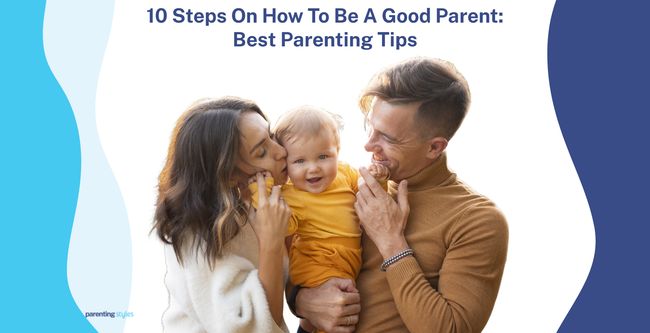
Self-esteem flourishes under good parenting through warmth, reasonable expectations, and granting autonomy. Positive affirmations and a balance of guidance and independence help children develop confidence and self-worth. Overparenting or controlling tendencies, however, impede problem-solving abilities and resilience. Warmth, support, fairness, and authoritative practices create balanced environments that boost self-esteem, emotional development, and long-term success.
Effective discipline integrates redirection, consistent rules, and natural consequences to instill responsibility and encourage positive behaviors. Authoritative parenting combines warmth with fair discipline. The authoritative style is considered the most effective in raising kids with better self-esteem, independence, and problem-solving skills, supporting academic and emotional growth. Qualities of a good parent involve being warm, supportive, fair, and consistent.
Parents overcoming difficult childhoods succeed by reflecting on personal experiences, regulating emotions, and utilizing resources such as therapy or parenting classes. Preparing during pregnancy through early parenting education equips expectant parents to address challenges and nurture strong relationships.
First-time parents strengthen bonds by responding to cues, engaging in meaningful interactions, and demonstrating emotional regulation to model resilience. Emphasizing self-care and understanding child development enhances their capacity to meet needs effectively. Strong parenting practices cultivate environments that nurture growth and well-being.
How should parents treat their children? Parents should treat their children with love, guidance, and respect. Good parents serve as positive role models.
Below are 10 tips on how to be a good parent who serves as a solid foundation for children’s well-being and success.
- Be Responsive: Responsive parenting helps children form a secure attachment, which is linked to optimal brain development and positive outcomes like higher self-esteem and well-being.
- Prioritize Relationships: A strong parent-child relationship is critical for emotional intelligence, resilience, happiness, and success, as shown by the Harvard Grant Study.
- Support Emotional Regulation: Emotional regulation promotes social skills, cognitive thinking, and mental health. Parents promote self-regulation by labeling, validating, and co-regulating their children’s emotions.
- Use Inductive Discipline: Kind and firm inductive discipline encourages children to develop empathy and internalize moral reasoning.
- Be Consistent: Consistency in discipline helps children understand boundaries, reduces anxiety, and fosters self-regulation and trust.
- Support Autonomy: Supporting autonomy builds independence, critical thinking skills, intrinsic motivation, and self-efficacy in children.
- Pick Your Battles: Choosing battles wisely by focusing on safety, health, and values strengthens the child-parent bond and supports behavior improvement.
- Reflect on Childhood: Reflecting on your childhood helps you understand your parenting style and make healthier choices for your child.
- Remember Self-Care: Prioritizing self-care and relationships helps parents manage stress and meet their children’s emotional needs effectively.
- Be a Role Model: A good role model teaches children positive behaviors like kindness, responsibility, and problem-solving through observation and imitation.
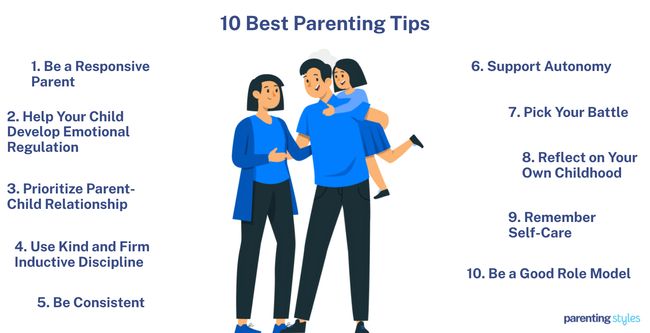
1. Be A Responsive Parent
Children, especially infants, with responsive parents are more likely to develop a healthy emotional bond with their parents. A healthy bond between a child and caregiver is called a secure attachment. Secure attachment is associated with optimal brain development, according to a 2015 study from Australia titled “Attachment and early brain development neuroprotective interventions in infant caregiver therapy,” by Louise Newman et al., published in Translational Developmental Psychiatry. Securely attached children tend to have better self-esteem, coping strategies, academic performance, and general well-being. Parents’ consistent responsiveness is the key to secure attachment.
Being responsive means attending to your child’s emotional needs. Acknowledge and validate their big feelings. Let them know they are seen and heard.
2. Prioritize Parent-Child Relationship
A strong parent-child relationship forms a solid foundation in child development. A close, positive relationship with an adult is the key to success and happiness, according to the 1938 Harvard Grant Study. Researchers confirmed the importance of parent-child relationships after following 268 male Harvard undergraduates, including notable figures like John F. Kennedy, over seventy years.
Parents prioritizing parent-child relationships promote their children’s emotional intelligence, resilience, happiness, and success. Putting relationships first earns you love and respect.
3. Help Your Child Develop Emotional Regulation
Social-emotional regulation supports a child’s development of self-confidence, empathy, social skills, cognitive thinking, mental health, and physical well-being. Emotional regulation is associated with fewer behavioral issues, stronger school performance, and better interpersonal relationships.
Parents help children develop socio-emotional regulation through emotion coaching, according to a 2014 study by Eva Alisic et al., “Emotion Regulation Among Preschoolers on a Continuum of Risk: The Role of Maternal Emotion Coaching,” published in the Journal of Child and Family Studies.
Coaching a child’s emotions involves labeling the child’s emotions, validating the child’s feelings, and co-regulating with the child. Labeling is acknowledging a child’s struggle. The child learns vocabulary to talk about their feelings. Validating is accepting the child’s emotions without judgment. Co-regulating is helping the child regulate by providing calm support and guidance.
4. Use Kind And Firm Inductive Discipline
Inductive discipline involves explaining why some behaviors are inappropriate and encouraging children to consider the impacts of any actions. Kind and firm inductive discipline helps children internalize moral reasoning and develop empathy. Adolescents have higher moral identities when their parents use inductive discipline, according to a 2012 study titled “Inductive Discipline, Parental Expression of Disappointed Expectations, and Moral Identity in Adolescence,” by Renee B. Patrick and John C. Gibbs, published in the Journal of Youth and Adolescence.
5. Be Consistent
Setting consistent limits creates a stable environment where children understand the consequences of their actions without ambiguity or confusion. Understanding the boundaries and considering the outcomes help children develop self-regulation. Predictability reduces anxiety and builds trust. Children raised with consistent discipline have fewer conduct issues, according to a 2017 study titled “Harsh Parenting, Child Behavior Problems, and the Dynamic Coupling of Parents’ and Children’s Positive Behaviors,” by Erika Lunkenheimer et al., published in the Journal of Family Psychology.
6. Support Autonomy
Supportive autonomy involves encouraging children to make choices, solve problems, and take responsibility for their actions while providing guidance and emotional support. Autonomy encourages independence and problem-solving, enhancing children’s critical thinking skills. Autonomy allows children to develop high intrinsic motivation and self-efficacy, according to the self-determination theory (SDT) in a 1987 study titled “The Support of Autonomy and the Control of Behavior,” by Deci, Edward L. and Ryan, Richard M., published in the Journal of Personality and Social Psychology.
7. Pick Your Battle
Focus on safety, health, and values rather than sweating the small stuff to reduce tension. Not insisting on immediate behavior change often builds a stronger parent-child bond. Your child will learn to behave over time, although their behavior does not change immediately. Change takes time and consistency. Like learning to write or ride a bike, mastering new behaviors takes practice and patience.
Every interaction, whether guiding or problem-solving together, is a lesson for your child to absorb. Your patience and understanding nurture their trust and eagerness to learn.
8. Reflect On Your Childhood
Reflecting on your childhood helps you understand your current parenting style. Intergenerational transmission of parenting styles tends to occur in authoritarian and permissive parenting styles, according to a 2007 study titled “Intergenerational continuities and discontinuities in parenting styles,” by Campbell, Jennifer, and Linda Gilmore, published in the Australian Journal of Psychology.
Unconscious parenting behaviors often surface when we become parents. Reflecting on your upbringing helps you uncover the reasons behind your parenting behaviors. Recognizing your past helps you address and alter unhealthy parenting patterns.
9. Remember Self-Care
Prioritize self-care and relationships. Many parents overlook their own needs or the health of their marriage after a child’s birth. Neglecting your well-being or spouse often leads to serious problems because stressed parents are more prone to conflicts and struggle to meet their children’s emotional needs. Seek support from friends and family when necessary.
10. Be A Good Role Model
Model the behavior you want your child to learn. Children absorb lessons by observing your actions more than listening to your words. Demonstrate the kindness, responsibility, and problem-solving skills you wish to see in them. Acknowledge and apologize when you make a mistake. Show your child that it is okay to be imperfect, and everyone learns from experience.
Research supports the power of modeling in parenting. Children with parents who model eating fruits and vegetables tend to consume adequate amounts, according to a 2014 study titled “Parental role modeling of fruits and vegetables at meals and snacks is associated with children’s adequate consumption,” by Jayne A Fulkerson et al., published in Appetite.
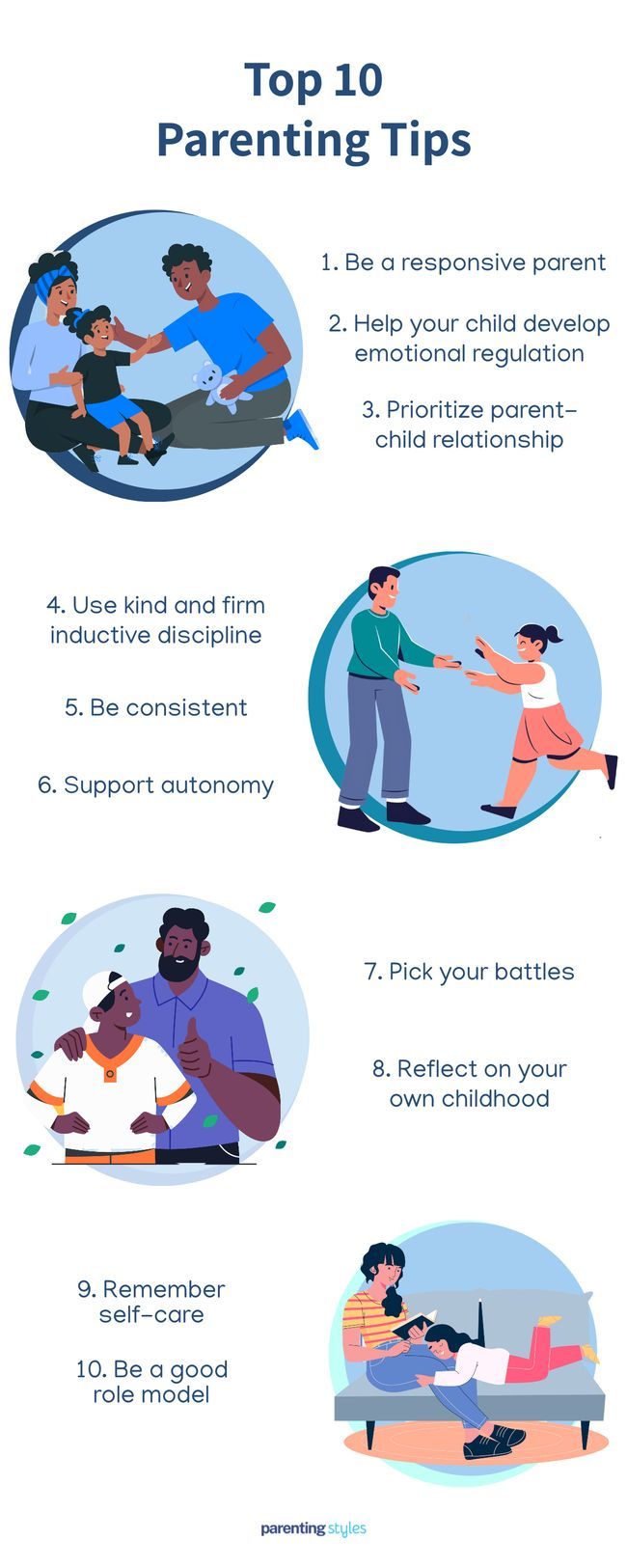
Why Should You Practice Good Parenting?
Good parenting lays the foundation for a child’s emotional, social, and intellectual development. Children raised with consistent, supportive, and positive parenting tend to develop strong self-esteem, resilience, and healthy relationships. Good parenting promotes life skills, including empathy, responsibility, and problem-solving. Life skills are essential for a child’s success and well-being.
Effective parenting shapes a child’s character and behavior by modeling values and setting clear expectations. Children learn to understand boundaries, manage emotions, and develop a sense of accountability when parents provide structure, encouragement, and appropriate discipline. Children feel secure and valued when they have consistently responsive parents.
The quality of parenting has a significant impact on a child’s academic success. Children with supportive and engaged parents tend to perform better in school. Good parenting techniques often result in better mental health. Lower internalizing (depression and anxiety) and externalizing problems (opposition and aggression) are lower, according to a 2014 study titled “Promoting Optimal Parenting and Children’s Mental Health: A Preliminary Evaluation of the How-to Parenting Program” by Mireille Joussemet et al., published in the Journal of Child and Family Studies. Good parenting skills enable children to thrive in the present and equip them with essential tools for lifelong growth.
What Is The Importance Of Good Parenting For Child Development?
The importance of good parenting for child development is that it forms the emotional, social, and intellectual foundations upon which children build their lives. Good parents create a secure and nurturing environment in raising children, fostering confidence, resilience, and positive social behavior. Good parenting includes providing basic needs like food, shelter, safety, emotional support, guidance, and discipline. All aspects of support play a vital role in children’s development and well-adjusted character.
Good parenting techniques, such as setting clear boundaries, offering encouragement, and being responsive to a child’s needs, help children develop self-discipline, empathy, and healthy relationships. The child gains skills for navigating complex social settings and forming meaningful connections in later life. Good parenting encourages cognitive development by providing children with learning opportunities, stimulating curiosity, and instilling a love for knowledge, laying the groundwork for academic success and lifelong learning.
Raising children in a positive environment enhances their mental health and well-being. Children who grow up with strong parental support and guidance are better equipped to handle stress and adversity. Children raised by good parenting tend to maintain stability throughout life.
What are the Positive Effects of Good Parenting On Children?
Positive effects of good parenting in children include secure attachment and better cognitive, emotional, behavioral, and mental health outcomes. The positive effects of good parenting on raising kids are listed below.
- Secure Attachment: A warm and responsive parent helps infants develop trust and secure attachment, according to a 2010 study titled “Good parenting: making a difference,” by Marjorie Smith and published in Early Human Development.
- Cognitive Development: Children with sensitive and warm parents are more engaged and committed to learning. Sensitivity allows parents to sense children’s needs more effectively, facilitating learning and willingness during parent-child interactions, according to a 2023 study titled “Positive parenting and early childhood cognition: a systematic review and meta-analysis of randomized controlled trials,” by Heather Prime et al., published in Clinical Children and Family Psychology Review.
- Emotional Development: Sensitive and supportive parenting promotes emotional regulation and reduces internalizing (e.g., sadness and anxiety) and externalizing symptoms (e.g., impulsiveness and aggression).
- Behavior: Adolescents raised by good parents exhibit lower rates of substance use, delinquency, and externalizing behaviors, according to a 2014 study titled “Consequences of parenting on adolescents,” by Donna Hancock Hoskins and published in Societies.
- Mental Health: Parenting that is cooperative, supportive, and warm helps teens feel more satisfied with life and socially cheerful by boosting their self-esteem. Children with the freedom to express thoughts and opinions show higher self-esteem, better psychosocial competence, reduced depression, and enhanced identity development. Supportive parenting, according to a 2016 study titled “The importance of positive parenting in predicting adolescent mental health,” conducted by Izabela Tabak and Dorota Zawadzka in Poland and published in the Journal of Family Studies.
- Resilience: Resilience is the ability to face and adapt to difficult situations. Behavioral and emotional support from positive parenting enhances children’s ability to adjust to stressful or threatening situations, leading to higher resilience, according to a 2023 study titled “Structural model of resilience based on parental support: the mediating role of hope and active coping,” by Hadis Cheraghian et al., published in BMC Psychiatry.
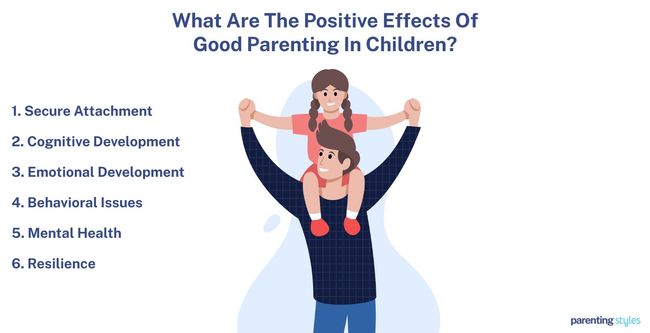
How does Good Parenting Boost a Child’s Self-Esteem?
Good parenting boosts a child’s self-esteem through warmth, demandingness, and autonomy. Parental care and affirmations help a child develop self-love and confidence, according to a 2019 study titled “Associations of parenting styles with self-esteem in children and adolescents: a meta-analysis,” by Martin Pinquart and Dana-Christina Gerke, published in the Journal of Child and Family Studies. A child feels valued upon being praised and supported, leading to increased self-esteem.
A balanced level of demandingness contributes to higher self-esteem. Parental demandingness is the extent to which parents set expectations, rules, and standards for their children’s behavior and performance. Reasonable expectations and guidance help children feel capable and successful, fostering positive self-worth.
Allowing a child to make independent decisions and choices promotes confidence in setting and achieving goals. Autonomy also communicates trust, helping a child feel valued, worthy, and capable of fulfilling ambitions. “
Are there Negative Effects of Good Parenting in Children?
Yes, there are negative effects of good parenting on children. Good parenting is characterized by love, support, discipline, and guidance. However, excessive nurturance and protection in raising children often result in reduced problem-solving skills and lower resilience, according to a 2013 study titled “Helping or hovering? The effects of helicopter parenting on college students’ well-being,” by Holly H. Schiffrin et al. and published in Journal of Child and Family Studies.
Extreme involvement and being a parent who overprotects a child lead to psychological difficulties like anxiety, stress, depression, and low life satisfaction in the emerging adult years. Shielding children from negative emotions and experiences hinders the development of self-efficacy, making perseverance in the face of difficulties more challenging.
Can Good Parenting Turn into Toxic Parenting?
Yes, good parenting can turn toxic if taken to an extreme. Parents who initially want to support and guide their children might cross a line into over-controlling or manipulative behavior. The desire for the child to have a good life sometimes leads to a parenting style that restricts the child’s freedom, leaving little room for self-expression. Good parenting can become narcissistic, where the parent focuses more on their desires or expectations than on the child’s needs.
The following are examples of situations where good parenting turns toxic.
- Overprotection Turning into Control: Overprotection escalates to control when a parent starts to dictate a child’s every move. For example, a parent who initially aims to shield a child from sickness begins to choose the child’s food for the day or which friends they should hang out with. A child should be allowed to maintain autonomy to sustain good parenting, according to a 2022 study titled “A systematic review of “helicopter parenting” and its relationship with anxiety and depression,” conducted by Julia Schønning Vigdal and Kolbjørn Kallesten Brønnick in Norway and published in Frontiers in Psychology. Provide options that let your child make decisions. Focus on understanding the child’s needs and desires instead of imposing actions.
- High Expectations Leading to Perfectionism: High expectations compel children to set unrealistic standards to avoid parental criticism, according to a 2021 study titled “The influence of parental perfectionism and parenting styles on child perfectionism,” conducted by Claudia Carmo et al. and published in Children. For example, a child perceives a mistake on a quiz as a failure because the parent always emphasized perfect scores. Set realistic and achievable expectations to prevent the child from being self-critical. Emphasize effort and learning from mistakes by praising the process over the outcomes.
- Excessive Praise Creating Dependency on Validation: Recognizing a child’s efforts is an important quality of good parenting but giving praises too often or without merit causes reliance on validation. For example, a child who receives praise for basic tasks, such as tying their shoes, expects constant affirmation for every action. Dependency on validation undermines children’s autonomy, performance, and long-term persistence, according to a 2019 study titled “Do Both Intrinsic and Identified Motivations Have Long-Term Effects,” by Yuan Liu et al. and published in The Journal of Psychology. Offer praise for specific actions and achievements. Ensure that the kid is also intrinsically motivated.
- Support Becoming Overinvolvement: The intent to protect a child from challenges often causes helicopter parenting, where parents become extensively involved in their children’s lives. For example, a parent calls the school administrator to resolve a dispute that a child could handle independently. Help the child develop problem-solving skills by discussing potential solutions. Encouraging a child to handle situations and providing guidance only when needed prevent overparenting, according to a 2022 study titled “Helicopter parenting, from good intentions to poor outcomes. What parents needs to know?” by Omna Shaki et al. and published in the Journal of Family Medicine and Primary Care.
- Shielding from All Discomfort: Negative emotions and experiences help children deal with challenges, according to a 2018 study titled “Childhood self-regulation as a mechanism through which early overcontrolling parenting is associated with adjustment in preadolescence,” conducted by Nicole B. Perry et al. and published in Developmental Psychology. Shielding a child from discomfort leads to toxic parenting as it leads to micromanagement, hindering the development of emotional regulation. Allow your child to experience common adverse situations like losing a game or having a small fight with a peer. Letting a child experience the natural consequences of actions promotes resilience and problem-solving skills, leading to emotional growth.
- Imposing Personal Goals onto Children: Projecting personal goals onto children means pressuring them to fulfill their parent’s ambitions. For example, a parent who wants to become a doctor might push a child to study medicine, ignoring the child’s interest in music. Projecting personal goals on children creates an emotionally abusive environment, according to a 2016 study titled “Narcissism, parenting, complex trauma: the emotional consequences created for children by narcissistic parents,” conducted by Donna M. Mahoney et al. and published in The Practitioner Scholar: Journal of Counseling and Professional Psychology. Support your child’s interests and encourage exploration to avoid toxic parenting.
What Makes a Good Parent?
What makes a good parent is the combination of unconditional warmth and responsiveness. A good parent provides consistent affection, care, and acceptance. The child’s basic and emotional needs receive adequate attention, and clear guidance on discipline is provided.
The characteristics of a good parent include helping children attain good health, behavior, and well-being, according to a 2010 study titled “Good parenting: making a difference,” by Marjorie Smith, published in Early Human Development.
Parental warmth and support increase self-esteem and act as a protective factor against negative influences. Predictable discipline and clear explanations of rules and expectations reduce adolescent frustration and behavior problems, according to a 2014 study titled “Consequences of parenting on adolescent outcomes,” by Donna Hancock Hoskins, published in Societies.
The qualities of a good parent are listed below.
- Warm and supportive
- Fair and consistent in discipline
- Cooperative
- Empathetic
- Supportive
- Empowering
- Well-behaved as a role model
- Attentive to quality time with the child
- Flexible
- Encouraging of independence
- Kind and firm in discipline
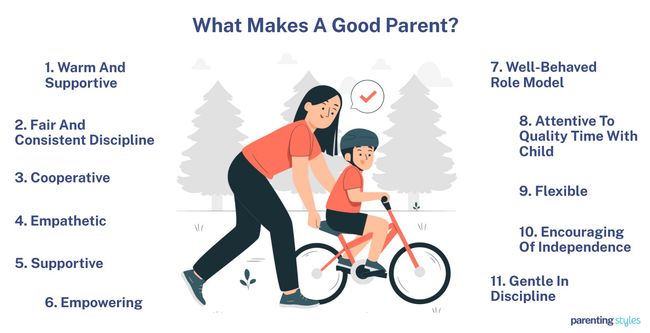
What Is The Best Parenting Style For A Good Parent?
The best parenting style for being a good parent is generally considered authoritative parenting. Authoritative parenting style combines warmth, responsiveness, and support with appropriate expectations and discipline. Children with authoritative parents earn higher grades in school, are more self-reliant, are less likely to engage in delinquent behavior and report less anxiety and depression among the four parenting styles. A 2013 study titled “Authoritative parenting and adolescent adjustment across varied ecological niches,” by Steinberg, Laurence et al., published in Adolescents and Their Families, presents these findings.
Authoritative parents show their children warmth and affection, making them feel loved and valued. Authoritative parents listen to their children’s feelings and thoughts, connecting with them positively. Rules are communicated, and children understand the reasons behind the rules. Discipline is fair and consistent, which helps children understand the consequences of their actions and develop a sense of responsibility. Authoritative parents encourage age-appropriate independence, allowing children to make choices and learn from their experiences. Authoritative parenting promotes self-esteem, confidence, and problem-solving skills in children. Good behavior is recognized and reinforced, encouraging children to make good choices. Children are encouraged to express their opinions, and parents respond with empathy and understanding.
How to Enforce Discipline as a Good Parent?
To enforce discipline as a good parent, redirect misbehavior, give positive attention to good behaviors, set consistent rules, and implement consequences. Ways to discipline a child as a good parent are listed below.
- Redirect Misbehavior: Redirecting misbehavior involves shifting a child’s focus from an undesirable behavior to a more positive one. An example of redirecting misbehavior is diverting a toddler’s attention from playing with a breakable glass object to playing with a ball.
- Give Attention to Good Behaviors: Attention reinforces a child’s positive behavior, making certain actions more likely to occur in the future, according to a 1991 study titled “Discipline in Early Childhood,” by Barbara J. Howard, published in Pediatric Clinics of North America. Pay attention to positive behaviors to encourage desired behaviors and ignore negative actions to prevent repeating undesired actions. For example, praise a child when sharing a toy with a playmate and avoid reacting or giving in to demands during tantrum episodes.
- Use Time-Outs: Time-outs involve a brief withdrawal of attention from a child to avoid reinforcing misbehaviors. An example of a time-out is moving a child to a quiet place free of reinforcers for a minute.
- Set Consistent Rules: Rules are guidelines that help a child understand norms and values. Set consistent rules so your child knows what behavior is expected. Explain the reasons behind the rules in a calm and age-appropriate manner. Ensure the rules are fair. For example, remind a child that “We do not touch the stove.” Let the child know the harms of touching the stove by explaining the danger of burns in simple terms and give guidance on what could be done instead.
- Use Natural Consequences: Natural consequences are the natural results of a particular action or decision. A child typically repeats a behavior after receiving reinforcing consequences, while inappropriate behaviors are discouraged after negative consequences. For example, a child who wakes up late due to playing video games the previous night and arrives late to school is more likely to go to bed earlier.
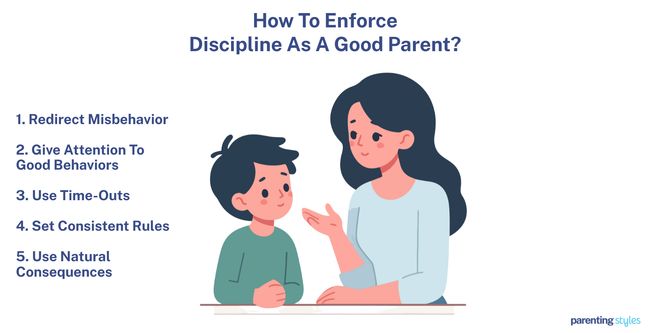
What is Bad Parenting?
Bad parenting is characterized by behaviors that harm a child’s development and well-being. Bad parents fail to monitor their children’s behavior, do not recognize deviant behavior, and use erratic or excessive punishment. Bad parenting prioritizes personal interests over their children’s best interests and well-being.
How to be a Good Parent after a Bad Childhood?
To be a good parent after a bad childhood involves reflecting and healing, prioritizing emotional regulation, attending parenting classes, taking small steps, and seeking professional guidance.
Parents with a bad childhood experience are at greater risk of engaging in problematic parenting, according to a 2020 study titled “Intergenerational effects of childhood maltreatment: A systematic review of the parenting practices of adult survivors of childhood abuse, neglect, and violence” conducted by Carolyn A. Greene et al., published in Clinical Psychology Review. Yet, many parents break the cycle and provide quality parenting. Ways to be a good parent after a bad childhood are listed below.
- Reflect and Start Healing: Identify experiences or reactions from past experiences that trigger bad parenting behaviors and slowly work on them. For example, if criticism was frequent during childhood, pay attention to how you address mistakes in your child. Recognizing and changing negative patterns leads to a healthier parenting approach.
- Prioritize Emotional Regulation: Hostile parenting is common in parents with abusive childhood experiences. Learn to regulate your emotions by practicing deep breathing or taking a second before responding to a child. Prioritizing emotional regulation breaks the cycle of negative parenting by ensuring children experience a supportive and nurturing environment.
- Take Parenting Classes: Skill-based training programs that allow parents to practice effective parenting techniques improve parental practices, according to a 2010 study titled “Good parenting: making a difference,” by Marjorie Smith, published in Early Human Development. Parenting classes are available at hospitals, pediatricians’ offices, community centers, social service facilities, and online.
- Take Small Steps: Practicing good parenting is sometimes overwhelming. Taking small steps makes the process more manageable. Focus on making gradual changes to build a more nurturing approach. Create meaningful memories with your child, as positive childhood experiences contribute to well-being, even during adverse experiences. according to a 2019 study titled “ACEs and counter-ACEs: How positive and negative childhood experiences influence adult health,” by AliceAnn Crandall et al., published in Child Abuse & Neglect.
- Seek Professional Guidance: Therapy effectively addresses trauma from adverse childhood experiences (ACEs), according to a 2019 study titled “Effects of a mindfulness-based intervention on self-compassion and psychological health among young adults with a history of childhood maltreatment,” by Dianne Joss, published in Frontiers in Psychology. Work with a licensed therapist to process unresolved feelings and gain insights about good parenting.
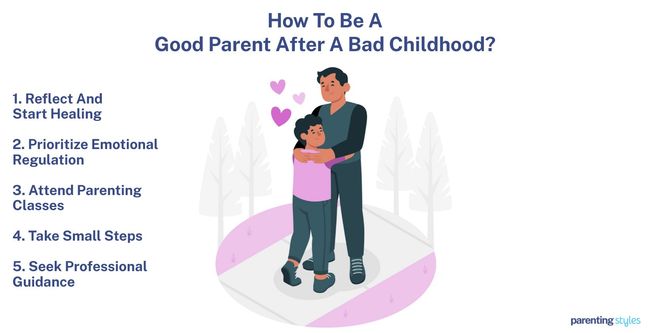
Should Expectant Parents Learn How To Be A Good Parent During Pregnancy?
Yes, expecting parents should learn how to be a good parent during the pregnancy period. Early preparation helps parents become mentally and emotionally prepared and reduce anxiety. Expecting parents often focus on essentials like diapers, feeding, and sleep schedules. Many new parents feel unprepared for issues like responding to a crying baby or disciplining a young child. Early education on these topics builds confidence and reduces stress.
What Are The Best Tips For Being A Good Parent For First-Time Parents?
The best tips for first-time parents include being responsive, prioritizing the child-parent relationship, and building emotional regulation. Below is the best advice for parents with a newborn baby on how to be good parents.
- Be Responsive to Baby: Be attuned and respond to cues from your baby, like cries, coos, and facial expressions, with care and attention. You cannot spoil a baby. Crying is the only way babies communicate their needs. Help your infant feel secure and understand by promptly meeting their needs. Reliability and predictability help your infant develop trust, strengthen your bond, and feel valued.
- Prioritize Relationship: Building a strong parent-child relationship is key for healthy child development. Spend quality time connecting with your baby through touch, eye contact, and gentle communication. Simple interactions like talking, singing, and holding your baby foster a sense of security and strengthen their attachment to you. This foundation of trust supports their emotional and social development as they grow.
- Help Build Emotional Regulation: Emotional regulation starts from infancy. Newborns learn to manage emotions by watching and feeling their parents’ reactions. Be responsive and calm, even when the baby is fussy or upset. Your steady presence helps them learn self-regulation. Your baby learns to mirror your reactions over time, laying the groundwork for resilience.
- Seek Support: Parenting advice for first-time parents is often overwhelming. It’s critical to seek help and allow yourself room to learn. Connect with family, friends, or other new parents to share experiences and ease the challenges of first-time parenting. Show yourself patience and self-compassion, and remember that your baby benefits most when you feel supported and balanced.
- Remember to Self-Care: Caring for a newborn is physically and emotionally demanding. Prioritize self-care and recharge. Take time for rest, hobbies, or connecting with friends. A well-cared-for parent creates a balanced environment where you and your baby thrive.
- Learn About Child Development: New parents often feel confused by conflicting advice. Understanding child development clarifies what supports a child’s well-being and distinguishes fact from myth. Learning about developmental milestones helps you respond appropriately to your baby’s needs. Child development knowledge enables you to make informed choices to promote healthy growth.
What Readers Are Saying
It's changed me to be a good mother as well as a responsible parents...I know what I should do